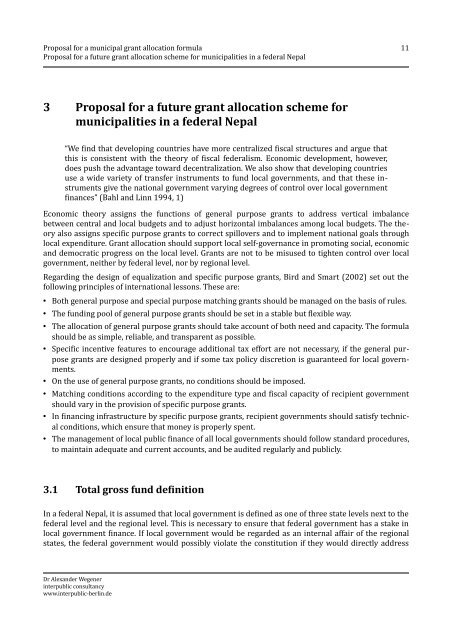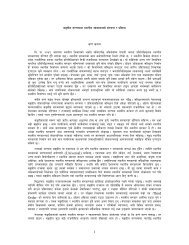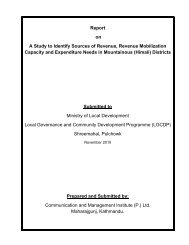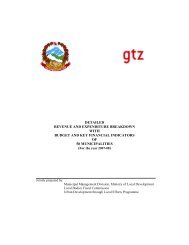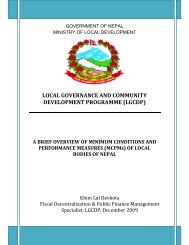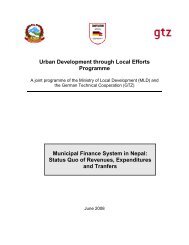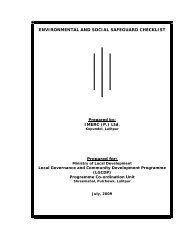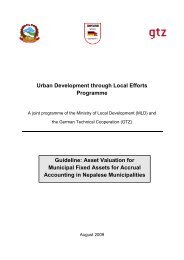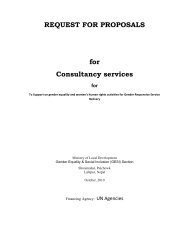GTZ Report on Proposal for Nepal Grant Formula - LGCDP
GTZ Report on Proposal for Nepal Grant Formula - LGCDP
GTZ Report on Proposal for Nepal Grant Formula - LGCDP
You also want an ePaper? Increase the reach of your titles
YUMPU automatically turns print PDFs into web optimized ePapers that Google loves.
<strong>Proposal</strong> <strong>for</strong> a municipal grant allocati<strong>on</strong> <strong>for</strong>mula 11<strong>Proposal</strong> <strong>for</strong> a future grant allocati<strong>on</strong> scheme <strong>for</strong> municipalities in a federal <strong>Nepal</strong>3 <strong>Proposal</strong> <strong>for</strong> a future grant allocati<strong>on</strong> scheme <strong>for</strong> municipalities in a federal <strong>Nepal</strong>“We oind that developing countries have more centralized oiscal structures and argue that this is c<strong>on</strong>sistent with the theory of oiscal federalism. Ec<strong>on</strong>omic development, however, does push the advantage toward decentralizati<strong>on</strong>. We also show that developing countries use a wide variety of transfer instruments to fund local governments, and that these in-struments give the nati<strong>on</strong>al government varying degrees of c<strong>on</strong>trol over local government oinances” (Bahl and Linn 1994, 1)Ec<strong>on</strong>omic theory assigns the functi<strong>on</strong>s of general purpose grants to address vertical imbalance between central and local budgets and to adjust horiz<strong>on</strong>tal imbalances am<strong>on</strong>g local budgets. The the-ory also assigns specioic purpose grants to correct spillovers and to implement nati<strong>on</strong>al goals through local expenditure. <strong>Grant</strong> allocati<strong>on</strong> should support local self-‐governance in promoting social, ec<strong>on</strong>omic and democratic progress <strong>on</strong> the local level. <strong>Grant</strong>s are not to be misused to tighten c<strong>on</strong>trol over local government, neither by federal level, nor by regi<strong>on</strong>al level.Regarding the design of equalizati<strong>on</strong> and specioic purpose grants, Bird and Smart (2002) set out the following principles of internati<strong>on</strong>al less<strong>on</strong>s. These are: • Both general purpose and special purpose matching grants should be managed <strong>on</strong> the basis of rules. • The funding pool of general purpose grants should be set in a stable but olexible way. • The allocati<strong>on</strong> of general purpose grants should take account of both need and capacity. The <strong>for</strong>mula should be as simple, reliable, and transparent as possible. • Specioic incentive features to encourage additi<strong>on</strong>al tax ef<strong>for</strong>t are not necessary, if the general pur-pose grants are designed properly and if some tax policy discreti<strong>on</strong> is guaranteed <strong>for</strong> local govern-ments.• On the use of general purpose grants, no c<strong>on</strong>diti<strong>on</strong>s should be imposed. • Matching c<strong>on</strong>diti<strong>on</strong>s according to the expenditure type and oiscal capacity of recipient government should vary in the provisi<strong>on</strong> of specioic purpose grants. • In oinancing infrastructure by specioic purpose grants, recipient governments should satisfy technic-al c<strong>on</strong>diti<strong>on</strong>s, which ensure that m<strong>on</strong>ey is properly spent. • The management of local public oinance of all local governments should follow standard procedures, to maintain adequate and current accounts, and be audited regularly and publicly. 3.1 Total gross fund de[initi<strong>on</strong>In a federal <strong>Nepal</strong>, it is assumed that local government is deoined as <strong>on</strong>e of three state levels next to the federal level and the regi<strong>on</strong>al level. This is necessary to ensure that federal government has a stake in local government oinance. If local government would be regarded as an internal affair of the regi<strong>on</strong>al states, the federal government would possibly violate the c<strong>on</strong>stituti<strong>on</strong> if they would directly address Dr Alexander Wegener interpublic c<strong>on</strong>sultancywww.interpublic-‐berlin.de


